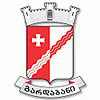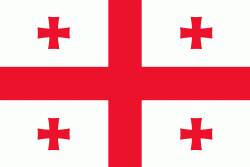Gardabani Municipality (Gardabnis Munitsip’alit’et’i)
 |
 |
After the annexation of the Kingdom of Kartli-Kakheti by the Russian Empire in 1801, the area of modern Gardabani administratively became part of the Tiflis Uyezd, which itself was part of the successive governates Georgia Governorate, Georgia-Imeretia Governorate and finally between 1846 and 1917 the Tiflis Governorate. Within the Tiflis Uyezd, present day Gardabani was located in the western half of the administrative uchastoks Karayaz (Караязский участок) and Sartachal (Сартачальский участок). The southern part (Karayaz) was mainly inhabited by Azerbaijanis, who at the time were referred to as Tatars like other Turkic-speaking ethnic groups.
In the 1918 elections in the Tiflis Mazra of the Democratic Republic of Georgia, Peri-Khan Sofiyeva from the village of Karajala (also known as Karajalari) was elected council member for the Karajaz district. According to historians, she was the first Muslim woman in the world to get elected through democratic elections, with universal suffrage.
Karayaz was situated on one of the main routes of the Red Army from Azerbaijan during the Soviet invasion of Georgia in February 1921, mainly due to the Baku - Tiflis railway line through the district and the Soviet use of armored trains. The Soviets came out on top at the end of February, and annexed the fledgling republic as the Georgian SSR. The area of Gardabani initially remained in the Tiflis Okrug with the administrative reorganization of the Georgian SSR around 1930, but in 1938 the Karayaz Raion was separated from the Tiflis Okrug. The village of Karayaz(i) (Караязы; also Karatapa, Кара-тапа, ყარატაფა, Qaratəpə) became the administrative center of the raion. Azerbaijanis were in the numerical majority in the new raion (68%).
In 1947 the name of the raion and the administrative center was changed to Gardabani. In 1969 the village of Gardabani received city status. After the collapse of the Soviet Union and Georgia's independence, economic conditions declined in the country, but the municipality generally managed to escape the great wave of emigration of the 1990s, despite pockets of migration such as from Gardabani city. In 1995 the raion was assigned to the newly formed region (mchare) Kvemo Kartli, and was transformed into a municipality in 2006.
In 2006, the boundaries of the Tbilisi metropolitan region were significantly modified at the expense of the surrounding municipalities and in particular Gardabani, which lost roughly 92 km2 to the metropolitan region. As for Gardabani, this mainly concerned the area on the northeast side of Tbilisi within the S9 Tbilisi Bypass, but also a large swath on the south side of Tbilisi. The municipality lost several settlements and many residents.
On August 8, 9, and 10, 2008, during the Russo-Georgian War, Russian planes bombed the Vaziani Air Force Base, located 20 kilometers east of Tbilisi in the municipality of Gardabani. Only the base was damaged and there were no casualties.
Map - Gardabani Municipality (Gardabnis Munitsip’alit’et’i)
Map
Country - Georgia_(country)
 |
 |
| Flag of Georgia (country) | |
During the classical era, several independent kingdoms became established in what is now Georgia, such as Colchis and Iberia. In the early 4th century, ethnic Georgians officially adopted Christianity, which contributed to the spiritual and political unification of the early Georgian states. In the Middle Ages, the unified Kingdom of Georgia emerged and reached its Golden Age during the reign of King David IV and Queen Tamar in the 12th and early 13th centuries. Thereafter, the kingdom declined and eventually disintegrated under the hegemony of various regional powers, including the Mongols, the Turks, and various dynasties of Persia. In 1783, one of the Georgian kingdoms entered into an alliance with the Russian Empire, which proceeded to annex the territory of modern Georgia in a piecemeal fashion throughout the 19th century.
Currency / Language
| ISO | Currency | Symbol | Significant figures |
|---|---|---|---|
| GEL | Georgian lari | ₾ | 2 |
| ISO | Language |
|---|---|
| HY | Armenian language |
| AZ | Azerbaijani language |
| KA | Georgian language |
| RU | Russian language |















